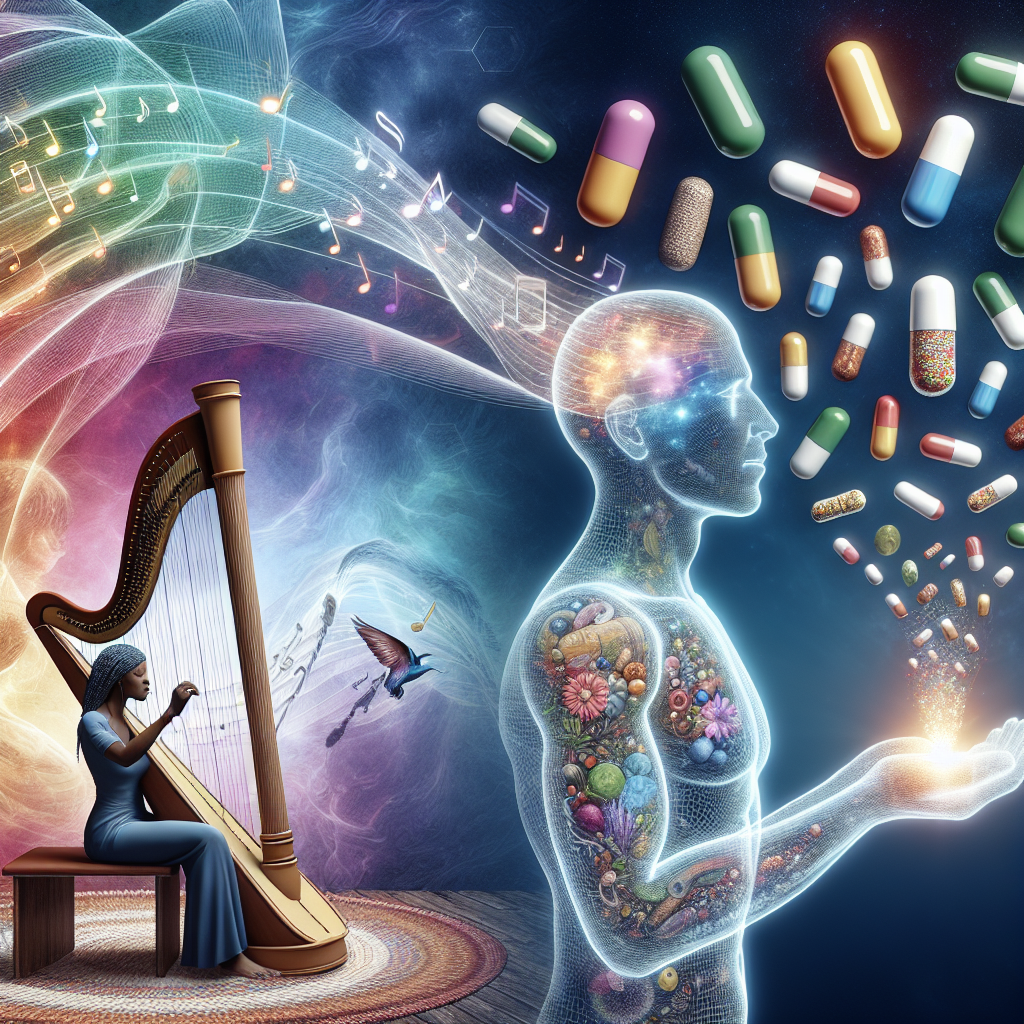How Music Therapy and Vitamins Work Together for Healing

Discover how music therapy and vitamins work together for healing. Uncover the power of this unique combination and how it can enhance your overall well-being. Visit My Vibrant Vitality to learn more.
The Synergistic Effects of Music Therapy and Vitamins on Healing
Music therapy and vitamins, two seemingly disparate elements, have been found to work in harmony to promote healing. This unique combination of sound and nutrition has been shown to have a synergistic effect on the body, enhancing both physical and mental well-being.
Music therapy, a form of expressive therapy, uses music to address physical, emotional, cognitive, and social needs of individuals. It involves a wide range of activities, including listening to music, singing, and playing a musical instrument. The therapeutic benefits of music are well-documented. It has been found to reduce stress, improve mood, and even alleviate pain.
On the other hand, vitamins are essential nutrients that our bodies need in small amounts to work properly. They play a crucial role in maintaining good health and wellbeing. Vitamins are involved in numerous biological processes, including cell growth and development, immune function, and energy production.
When music therapy and vitamins are combined, they can have a profound impact on healing. The soothing effects of music can help to reduce stress and anxiety, which in turn can enhance the body’s ability to absorb and utilize vitamins. Stress has been shown to interfere with the body’s ability to absorb nutrients, so by reducing stress, music therapy can potentially enhance the effectiveness of vitamins.
Moreover, certain vitamins, such as B vitamins, are known to support brain health and cognitive function. Music therapy, particularly activities that involve playing an instrument or singing, can stimulate the brain and improve cognitive function. Therefore, the combination of music therapy and B vitamins can have a synergistic effect on brain health and cognitive function.
In addition, music therapy can also enhance the effects of vitamins on the immune system. Music has been found to boost the immune system by reducing stress and increasing the level of antibodies in the body. Vitamins, particularly vitamin C and E, are known to support immune function. Therefore, the combination of music therapy and these vitamins can potentially enhance immune function and promote healing.
Furthermore, music therapy can also complement the effects of vitamins on mood and mental health. Music has been found to stimulate the release of dopamine, a neurotransmitter associated with feelings of pleasure and happiness. Certain vitamins, such as vitamin D and B vitamins, are known to support mood and mental health. Therefore, the combination of music therapy and these vitamins can potentially enhance mood and mental health.
In conclusion, the synergistic effects of music therapy and vitamins on healing are profound. The combination of these two elements can enhance physical and mental well-being, promote healing, and improve quality of life. However, it’s important to note that while music therapy and vitamins can support healing, they should not be used as a substitute for conventional medical treatment. Always consult with a healthcare professional before starting any new therapy or supplement regimen.
Exploring the Connection between Music Therapy and Vitamin Intake for Enhanced Recovery

Music therapy and vitamin intake may seem like two disparate elements, but recent studies suggest that they can work together to promote healing and recovery. This intriguing connection is rooted in the understanding that both music and vitamins have profound effects on our physical and mental health.
Music therapy, a burgeoning field in healthcare, uses music interventions to address physical, emotional, cognitive, and social needs of individuals. It has been found to reduce stress, alleviate pain, enhance memory, and improve communication, among other benefits. On the other hand, vitamins, essential nutrients that our bodies need in small amounts, play a crucial role in maintaining our health and wellbeing. They aid in healing and recovery by boosting our immune system, repairing cellular damage, and promoting growth and development.
The connection between music therapy and vitamin intake lies in their shared ability to stimulate the body’s natural healing processes. Music therapy, through its calming and uplifting effects, can help to reduce stress and anxiety, which are known to impede healing. By lowering stress levels, music therapy can help to create a more conducive environment for healing, allowing the body to focus its resources on recovery.
Vitamins, particularly those with antioxidant properties such as vitamins C and E, can further enhance this healing environment. Antioxidants help to protect our cells from damage by neutralizing harmful free radicals, which can impede healing. By ensuring an adequate intake of these vitamins, we can support our body’s natural healing processes and potentially speed up recovery.
Moreover, certain vitamins are known to have a direct impact on our mental health. For instance, vitamin B6 is essential for the production of serotonin, a neurotransmitter that helps to regulate mood. A deficiency in this vitamin can lead to depression and other mental health issues. Music therapy, with its ability to stimulate the production of serotonin, can therefore complement the effects of vitamin B6, providing a holistic approach to mental health care.
In addition, music therapy and vitamin intake can work together to enhance cognitive function. Music therapy has been found to improve memory and cognitive function in individuals with Alzheimer’s disease and other forms of dementia. Similarly, certain vitamins, such as vitamin B12, are known to support brain health and cognitive function. By combining music therapy with an adequate intake of these vitamins, we can potentially enhance cognitive function and slow cognitive decline.
In conclusion, the connection between music therapy and vitamin intake for enhanced recovery is a fascinating area of study. Both music therapy and vitamins have unique healing properties that can complement each other to promote physical and mental health. By integrating these two elements into our healthcare regimen, we can potentially enhance our body’s natural healing processes, improve our mental health, and boost our cognitive function. As research in this area continues to evolve, we can look forward to discovering more about how music therapy and vitamins can work together for healing.
The Role of Music Therapy and Vitamins in Holistic Healing Approaches
Music therapy and vitamins, two seemingly disparate elements, have been found to work in harmony to promote healing. This unique combination is gaining traction in the realm of holistic healing, a field that emphasizes the treatment of the whole person, including physical, emotional, mental, and spiritual aspects. The integration of music therapy and vitamins into a comprehensive wellness plan can yield significant benefits, enhancing both physical health and emotional well-being.
Music therapy, a clinical and evidence-based health profession, uses music interventions to accomplish individualized goals within a therapeutic relationship. It can be a powerful tool in the healing process, helping to reduce stress, alleviate pain, express feelings, enhance memory, and improve communication. Music therapy can be particularly beneficial for individuals dealing with mental health issues, such as depression and anxiety, as well as those recovering from physical health problems, like stroke or surgery.
On the other hand, vitamins play a crucial role in maintaining good health and well-being. They are essential nutrients that the body needs in small amounts to work properly and stay healthy. Most vitamins need to come from food because the body either does not produce them or produces them in insufficient quantities. Vitamins can boost the immune system, support normal growth and development, and help cells and organs do their jobs. For instance, Vitamin C is known for its immune-boosting properties, while Vitamin D is essential for bone health.
When music therapy and vitamins are combined in a holistic healing approach, they can complement each other to promote overall wellness. Music therapy can help to create a relaxed and positive environment, which can enhance the body’s ability to absorb and utilize vitamins. For example, stress can interfere with the body’s ability to absorb nutrients, but music therapy can help to reduce stress levels, thereby improving nutrient absorption.
Moreover, certain vitamins can enhance the benefits of music therapy. For instance, B vitamins are known for their ability to boost energy levels and improve brain function. When combined with music therapy, which can stimulate brain activity, B vitamins can help to enhance cognitive function and mental clarity.
In addition, music therapy and vitamins can work together to support emotional well-being. Music therapy can help individuals express and process their emotions, while certain vitamins, such as B vitamins and Vitamin D, have been linked to mood regulation. Therefore, the combination of music therapy and vitamins can help to promote emotional balance and stability.
In conclusion, the integration of music therapy and vitamins in a holistic healing approach can offer a multitude of benefits. This unique combination can enhance physical health, support emotional well-being, and promote overall wellness. As research continues to explore the synergistic effects of music therapy and vitamins, it is clear that this holistic approach holds great potential for healing and wellness. Therefore, it is worth considering the inclusion of music therapy and vitamins in a comprehensive wellness plan.